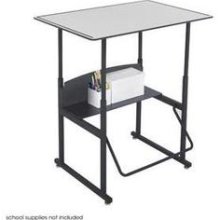Comic Books and Chemistry: a Perfect Match!
When I was in 8th grade my history teacher had us learn about economics through, of all things, a comic book, and now almost 40 years later, I can still remember it. So what does that say about learning? It says to me that the material, which I found incredibly boring, was presented to me in a medium that engaged me-hence I truly learned it. Later when I got to high school I found myself bored to death in a chemistry class and distinctly remember having to memorize the periodic table. Why I had to do that, when I could have just looked it up when I needed the information, I'll never know. I did it, but didn't care about the information or understand why we were learning it, so I remembered if for the test and promptly forgot it. Sound familiar? But after looking at the University of Kentucky site The Periodic Table of Comic Books by John P. Selegue and F. James Holler, I wish I could go back and study it this way. Like the economics unit in my Junior High days, I would proba
